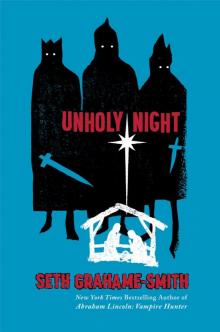- Home
- Seth Grahame-Smith
PRIDE AND PREJUDICE AND ZOMBIES Page 2
PRIDE AND PREJUDICE AND ZOMBIES Read online
Page 2
CHAPTER 4
WHEN JANE AND ELIZABETH WERE ALONE, the former, who had been cautious in her praise of Mr. Bingley before, expressed to her sister just how very much she admired him.
“He is just what a young man ought to be,” said she, “sensible, good-humoured, lively; and I never saw such happy manners! So much ease, with such perfect good breeding!”
“Yes,” replied Elizabeth, “but in the heat of battle, neither he nor Mr. Darcy were to be found with blade or bludgeon.”
“Well, I was very much flattered by his asking me to dance a second time. I did not expect such a compliment.”
“He certainly is very agreeable, and I give you leave to like him, despite his lack of gallantry. You have liked many a stupider person.”
“Dear Lizzy!”
“Oh! You are a great deal too apt, you know, to like people in general. You never see a fault in anybody. I never heard you speak ill of a human being in your life.”
“I would not wish to be hasty in censuring anyone.”
“With your good sense, to be so honestly blind to the follies and nonsense of others! You like this man’s sisters, too, do you? Their manners are not equal to his.”
They were in fact very fine ladies; not deficient in the power of making themselves agreeable when they chose it, but proud and conceited. They were rather handsome, had been educated in one of the first private seminaries in town, but knew little of the deadly arts in which she and her own sisters had been so thoroughly trained-both in England, and during their trips to the Orient.
As for Mr. Bingley himself, between him and Darcy there was a very steady friendship, in spite of great opposition of character. Bingley was by no means deficient, but Darcy was clever. He was at the same time haughty, reserved, and fastidious, and his manners, though well-bred, were not inviting. In that respect his friend had greatly the advantage. Bingley was sure of being liked wherever he appeared, Darcy was continually giving offense.
But what no one-not even Mr. Bingley-knew, was the reason behind Darcy’s cold demeanor. For until recently, he had been the very picture of pleasantry; a young man of merry disposition and utmost attentiveness. But his nature had been forever altered by a betrayal he had not the stomache to speak of.
CHAPTER 5
WITHIN A SHORT THOUGH PERILOUS WALK of Longbourn lived a family with whom the Bennets were particularly intimate. Sir William Lucas had been formerly a maker of fine burial gowns of such stately beauty that the King had seen fit to knight him. He had made a tolerable fortune, until the strange plague had rendered his services unnecessary. Few thought it worth the expense to dress the dead in finery when they would only soil it upon crawling out of their graves. He had removed with his family to a house about a mile from Meryton.
Lady Lucas was a very good kind of woman, not too clever to be a valuable neighbour to Mrs. Bennet. They had several children. The eldest of them, a sensible, intelligent young woman, about twenty-seven, was Elizabeth’s intimate friend.
“You began the evening well, Charlotte,” said Mrs. Bennet with civil self-command to Miss Lucas. “You were Mr. Bingley’s first choice.”
“Yes; but he seemed to like his second better.”
“Oh! You mean Jane, I suppose, because he danced with her twice, and because she fought so valiantly against the unmentionables.”
“Did not I mention what I heard between him and Mr. Robinson? Mr. Robinson’s asking Mr. Bingley how he liked our Meryton assemblies, and whether he did not think there were many pretty women in the room, and which he thought the prettiest? And his answering immediately to the last question, ‘Oh! the eldest Miss Bennet, beyond a doubt; there cannot be two opinions on that point.’”
“Upon my word! Well, that is very decided indeed.”
“Mr. Darcy is not so well worth listening to as his friend, is he,” said Charlotte. “Poor Eliza! To be called only tolerable.”
“I beg you would not put it into Lizzy’s head to be vexed by his ill-treatment; for he is such a disagreeable man, that it would be quite a misfortune to be liked by him. Mrs. Long told me last night…” Mrs. Bennet’s voice failed her at the thought of poor Mrs. Long, her skull crushed betwixt the teeth of those wretched creatures. The ladies sat in silent contemplation for a few moments.
“Miss Bingley told me,” said Jane, finally, “that he never speaks much, unless among his intimate acquaintances. With them he is remarkably agreeable.”
“His pride,” said Miss Lucas, “does not offend me so much as pride often does, because there is an excuse for it. One cannot wonder that so very fine a young man, with family, fortune, everything in his favour, should think highly of himself. If I may so express it, he has a right to be proud.”
“That is very true,” replied Elizabeth, “and I could easily forgive his pride, if he had not mortified mine. I dare say I would’ve cut his throat had not the unmentionables distracted me from doing so.”
“Pride,” observed Mary, who piqued herself upon the solidity of her reflections, “is a very common failing, I believe. By all that I have ever read, I am convinced that it is very common indeed.”
Elizabeth could not help but roll her eyes as Mary continued.
“Vanity and pride are different things, though the words are often used synonymously. A person may be proud without being vain. Pride relates more to our opinion of ourselves, vanity to what we would have others think of us.”
At this point, Elizabeth let out a most palpable yawn. Though she admired Mary’s bravery in battle, she had always found her a trifle dull in relaxed company.
CHAPTER 6
THE LADIES OF LONGBOURN soon waited on those of Netherfield. Jane’s pleasing manners grew on the goodwill of Mrs. Hurst and Miss Bingley; and though the mother was found to be intolerable, and the younger sisters not worth speaking to, a wish of being better acquainted with them was expressed towards the two eldest. By Jane this attention was received with the greatest pleasure, but Elizabeth still saw superciliousness in their treatment of everybody. It was generally evident whenever they met, that Mr. Bingley did admire her and to her it was equally evident that Jane was in a way to be very much in love; but she considered with pleasure that it was not likely to be discovered by the world in general. Elizabeth mentioned this to her friend Miss Lucas.
“It may perhaps be pleasant,” replied Charlotte, “but it is sometimes a disadvantage to be so very guarded. If a woman conceals her affection with the same skill from the object of it, she may lose the opportunity of fixing him. In nine cases out of ten a women had better show more affection than she feels. Bingley likes your sister undoubtedly; but he may never do more than like her, if she does not help him on.”
“But she does help him on, as much as her nature will allow. Remember, Charlotte-she is a warrior first, and a woman second.”
“Well,” said Charlotte, “I wish Jane success with all my heart; and if she were married to him to-morrow, I should think she had as good a chance of happiness as if she were to be studying his character for a twelvemonth. Happiness in marriage is entirely a matter of chance, and it is better to know as little as possible of the defects of the person with whom you are to pass your life.”
“You make me laugh, Charlotte; but it is not sound. You know it is not sound, and that you would never act in this way yourself.”
“Remember, Elizabeth-I am not a warrior as you are. I am merely a silly girl of seven-and-twenty years, and that without a husband.”
Occupied in observing Mr. Bingley’s attentions to her sister, Elizabeth was far from suspecting that she was herself becoming an object of some interest in the eyes of his friend. Mr. Darcy had at first scarcely allowed her to be pretty; he had looked at her without admiration at the ball; and when they next met, he looked at her only to criticize. But no sooner had he made it clear to himself and his friends that she hardly had a good feature in her face, than he began to find it was rendered uncommonly intelligent by the beautiful expression
of her dark eyes, and her uncommon skill with a blade. To this discovery succeeded some others equally mortifying. Though he had detected more than one failure of perfect symmetry in her form, he was forced to acknowledge her figure to be light and pleasing, and her arms surprisingly muscular, though not so much as to diminish her femininity.
He began to wish to know more of her, and as a step towards conversing with her himself, attended to her conversation with others. His doing so drew her notice. It was at Sir William Lucas’s, where a large party were assembled.
“What does Mr. Darcy mean,” said she to Charlotte, “by listening to my conversation with Colonel Forster?”
“That is a question which Mr. Darcy only can answer.”
“Well if he does it any more I shall certainly let him know that I see what he is about. I have not yet forgiven him for insulting my honour, and may yet have his head upon my mantle.”
Mr. Darcy approached them soon afterwards. Elizabeth turned to him and said, “Did you not think, Mr. Darcy, that I expressed myself uncommonly well just now, when I was teasing Colonel Forster to give us a ball at Meryton?”
“With great energy; but balls are always a subject which makes a lady energetic.”
“It depends on who’s throwing them, Mr. Darcy.”
“Well,” said Miss Lucas, her faced suddenly flushed, “I am going to open the instrument, Eliza, and you know what follows.”
“You are a very strange creature by way of a friend! Always wanting me to play and sing before anybody and everybody!”
Elizabeth’s performance was pleasing, though by no means capital. After a song or two, she was eagerly succeeded at the instrument by her sister Mary, who, at the end of a long concerto, joined eagerly in dancing with her younger sisters, some of the Lucases, and two or three officers at one end of the room.
Mr. Darcy stood near them in silent indignation at such a mode of passing the evening, to the exclusion of all conversation, and was too much engrossed by his thoughts to perceive that Sir William Lucas stood beside him, till Sir William thus began:
“What a charming amusement for young people this is, Mr. Darcy!”
“Certainly, sir; and it has the advantage also of being in vogue amongst the less polished societies of the world. Every savage can dance. Why, I imagine even zombies could do it with some degree of success.”
Sir William only smiled, not sure of how to converse with so rude a gentleman. He was much relieved at the sight of Elizabeth approaching.
“My dear Miss Eliza, why are you not dancing? Mr. Darcy, you must allow me to present this young lady to you as a very desirable partner. You cannot refuse to dance, I am sure, when so much beauty is before you.” He took Miss Bennet’s hand and presented it to Mr. Darcy, who was not unwilling to receive it. But she instantly drew back, and said with some discomposure to Sir William, “Indeed, sir, I have not the least intention of dancing. I entreat you not to suppose that I moved this way in order to beg for a partner.”
Mr. Darcy, with grave propriety, requested the honour of her hand, but in vain. Elizabeth was determined. She looked archly, and turned away. Her resistance had not injured her with Mr. Darcy, for indeed he was thinking of her with some complacency, when thus accosted by Miss Bingley:
“I can guess the subject of your reverie.”
“I should imagine not.”
“You are considering how insupportable it would be to pass many evenings in this manner-the insipidity, the noise, the nothingness, and yet the self-importance of all those people! What would I give to hear your strictures on them!”
“You conjecture is totally wrong, I assure you. My mind was more agreeably engaged. I have been meditating on the very great pleasure which a pair of fine eyes in the face of a pretty woman can bestow.”
Miss Bingley immediately fixed her eyes on his face, and desired he would tell her what lady had the credit of inspiring such reflections. Mr. Darcy replied:
“Miss Elizabeth Bennet.”
“Miss Elizabeth Bennet!” repeated Miss Bingley. “Defender of Longbourn? Heroine of Hertfordshire? I am all astonishment. You will be having a charming mother-in-law, indeed; and, of course, the two of you would fell many an unmentionable with your combined proficiencies in the deadly arts.”
He listened to her with perfect indifference while she chose to entertain herself in this manner; and as his composure convinced her that all was safe, her wit flowed long.
CHAPTER 7
MR. BENNET’S PROPERTY consisted almost entirely in an estate of two thousand a year, which, unfortunately for his daughters, was entailed, in default of heirs male, on a distant relation; and unfortunately for all, was surrounded on all sides by high ground, making it troublesome to defend. Their mother’s fortune, though ample for her situation in life, could but ill supply the deficiency of his. Her father had been an attorney in Meryton, and had left her four thousand pounds.
She had a sister married to a Mr. Philips, who had been a clerk to their father and succeeded him in the business, and a brother settled in London, where he had earned his letters in science, and where he now owned a pair of factories dedicated to the war effort.
The village of Longbourn was only one mile from Meryton; a most convenient distance for the young ladies, who were usually tempted thither three or four times a week, despite the unmentionables which frequently beset travelers along the road, to pay their duty to their aunt and to a milliner’s shop just over the way. The two youngest of the family, Catherine and Lydia, were particularly frequent in these attentions; their minds were more vacant than their sisters’, and when nothing better offered, a walk to Meryton was necessary to amuse their morning hours, and occasionally, practice their skills. At present, indeed, they were well supplied both with news and happiness by the recent arrival of a militia regiment in the neighbourhood; it was to remain the whole winter, wresting coffins from the hardened earth and setting fire to them. Meryton was to be the headquarters.
Their visits to Mrs. Philips were now productive of the most interesting intelligence. Every day added something to their knowledge of the officers’ names and connections, and fresh news from the battlefields of Derbyshire, Cornwall, and Essex-where the fighting was at its fiercest. They could talk of nothing but officers; and Mr. Bingley’s large fortune, the mention of which gave animation to their mother, was worthless in their eyes when opposed to the regimentals of an ensign, and the excited manner in which he spoke of beheading the stricken with a single touch of his sword.
After listening one morning to their effusions on this subject, Mr. Bennet coolly observed, “From all that I can collect by your manner of talking, you must be two of the silliest girls in the country. I have suspected it some time, but I am now convinced.”
“I am astonished, my dear,” said Mrs. Bennet, “that you should be so ready to think your own children silly.”
“If my children are silly, I must hope to be always sensible of it.”
“Yes-but as it happens, they are all of them very clever. You forget how quickly they became proficient in those Oriental tricks you insisted on bestowing them.”
“Being practiced enough to kill a few of the sorry stricken does not make them sensible, particularly when their skills are most often applied for the amusement of handsome officers.”
“Mamma,” cried Lydia, “my aunt says that Colonel Forster and Captain Carter do not go so often to Miss Watson’s as they did when they first came; she sees them now very often burning the crypts in Shepherd’s Hill Cemetery.”
Mrs. Bennet was prevented replying by the entrance of the footman with a note for Miss Bennet; it came from Netherfield, and the servant waited for an answer.
“Well, Jane, who is it from? What is it about?”
“It is from Miss Bingley,” said Jane, and then read it aloud.
MY DEAR FRIEND,
If you are not so compassionate as to dine to-day with Louisa and me, we shall be in danger of hating each other for the re
st of our lives, for a whole day’s tête-à-tête between two women can never end without a quarrel. Come as soon as you can on receipt of this, provided the road is free of the unmentionable menace. My brother and the gentlemen are to dine with the officers.
Yours ever,
CAROLINE BINGLEY
“Dining out,” said Mrs. Bennet, “that is very unlucky, given the troubles on the road to Netherfield.”
“Can I have the carriage?” said Jane.
“No, my dear, you had better go on horseback, because it seems likely to rain; and they spring so easily from the wet earth. I should prefer you have speed at your disposal; besides, if it rains, you must stay all night.”
“That would be a good scheme,” said Elizabeth, “if you were sure that they would not offer to send her home.”
“I had much rather go in the coach,” said Jane, clearly troubled by the thought of riding alone.
“But, my dear, your father cannot spare the horses, I am sure. They are wanted in the farm, Mr. Bennet, are they not?”
“They are wanted in the farm much oftener than I can get them, and too many slaughtered upon the road already.”
Jane was therefore obliged to go on horseback, and her mother attended her to the door with many cheerful prognostics of a bad day. Her hopes were answered; Jane had not been gone long before it rained hard, and the soft ground gave way to scores of the disagreeable creatures, still clad in their tattered finery, but possessing none of the good breeding that had served them so well in life.
Her sisters were uneasy for her, but her mother was delighted. The rain continued the whole evening without intermission; Jane certainly could not come back.

 PRIDE AND PREJUDICE AND ZOMBIES
PRIDE AND PREJUDICE AND ZOMBIES Abraham Lincoln: Vampire Hunter
Abraham Lincoln: Vampire Hunter The Last American Vampire
The Last American Vampire How to Survive a Horror Movie
How to Survive a Horror Movie Unholy Night
Unholy Night